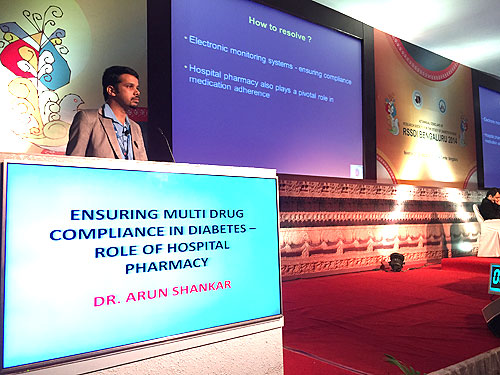
Ensuring Multi drug Compliance in Diabetes: Role of Hospital Pharmacy
![]()
 This original research was presented by Dr.Arun Shankar at the 42nd RSSDI Convention. The paper was co-authored by Dr.Shashank Joshi, Dr.Banshi Saboo, Dr.Arun Shankar, Gopika Krishnan and Sunitha Jothydev.
This original research was presented by Dr.Arun Shankar at the 42nd RSSDI Convention. The paper was co-authored by Dr.Shashank Joshi, Dr.Banshi Saboo, Dr.Arun Shankar, Gopika Krishnan and Sunitha Jothydev.
Type 2 diabetes is a component of metabolic syndrome in which the management strategy should address multiple pathophysiological abnormalities. A comprehensive treatment regimen will include oral agents, insulins/Incretins, statins, anti hypertensives, ARBs, Vitamin D, etc etc. in varying permutations and combinations so as to suit specific patient requirements. However, evidence suggests that a large majority of patients fail to adhere to medication regimes and other aspects of self management. Despite advances in investigations, awareness generation, discovery of new drugs and delivering therapies; treatment of diabetes still fails in majority. One major reason for this failure could be varying degrees of drug compliance. Literature search revealed that electronic monitoring systems were effective in ensuring compliance in individual patients. The hospital pharmacy also plays a pivotal role in medication adherence. In this context, we sought to evaluate the effect of linking hospital pharmacy to electronic monitoring systems to ensure medication adherence in diabetes patients visiting our hospital.
![]()
 CQ4 for Compliance questionnaire was administered to patients who visited the hospital from March 2013 to February 2014 based on a random sampling. Patient demographics, treatment, outcome, and co-morbidities were also collected from patient's medical records. 2946 patients were approached and 2867 patients responded to the survey. Written informed consent was obtained from the respondents. The reminder calls via electronic monitoring systems and pharmacy alerts from the hospital pharmacy were recorded. Patients were categorised into
2 groups based on the records of purchase of medications from hospital pharmacy for the period of the study.
CQ4 for Compliance questionnaire was administered to patients who visited the hospital from March 2013 to February 2014 based on a random sampling. Patient demographics, treatment, outcome, and co-morbidities were also collected from patient's medical records. 2946 patients were approached and 2867 patients responded to the survey. Written informed consent was obtained from the respondents. The reminder calls via electronic monitoring systems and pharmacy alerts from the hospital pharmacy were recorded. Patients were categorised into
2 groups based on the records of purchase of medications from hospital pharmacy for the period of the study.
![]() Patients who purchased medications from the hospital pharmacy on a regular basis were found to have maximum medication adherence (93.67%). There was a statistically significant reduction in HbA1c (1.2%) and a reduction in total cholesterol of -43 mg/dl.
This study is an eye opener to prove the importance of linking the hospital pharmacy directly to patient care and the first evidence to prove profound clinical benefits in subjects with diabetes.
Patients who purchased medications from the hospital pharmacy on a regular basis were found to have maximum medication adherence (93.67%). There was a statistically significant reduction in HbA1c (1.2%) and a reduction in total cholesterol of -43 mg/dl.
This study is an eye opener to prove the importance of linking the hospital pharmacy directly to patient care and the first evidence to prove profound clinical benefits in subjects with diabetes.
Read More
For enquiries info@jothydev.net.
Please visit: jothydev.net | research.jothydev.com | diabscreenkerala.net | jothydev.com/newsletter
